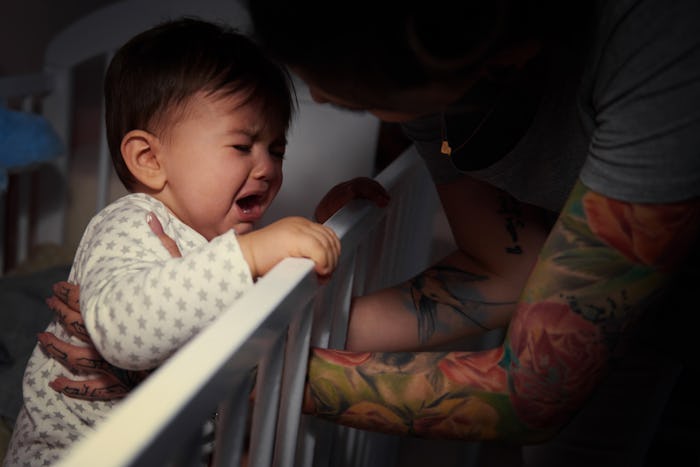Life

For new parent, and parents in general, it's completely normal to struggle with exhaustion and trying to get your little one to adopt a consistent bedtime routine. And if it's your first child, it's also understandable to check (and double-check) every little thing your baby does. I can't tell you how many times I called my son's pediatrician's office in the first few months to make sure I wasn't ignoring some potentially awful health issue. So when you're attempting to lull your tiny tot into a peaceful slumber, there are a few sleep training difficulties you shouldn't assume are normal.
Since babies, just like adults, come in all shapes, sizes, and personalities, sometimes it can be difficult to tell if your infant is just being fussy or if they have colic, for instance. Unfortunately, parenting doesn't really come with a manual. But if it did, I'd argue that it'd be akin to an IKEA assembly guide. You'd have all the instructions but would still end up crying and confused. So how can you tell what is and isn't cause for concern when it comes to your baby's bedtime habits? Check out these sleep training difficulties that aren't normal. And, as always, if you ever suspect something might be wrong, trust your gut and reach out to a medical professional.
1
Your Baby Is Overly Tired
It's normal for both parent and baby to be a bit groggy in the early stages of sleep training, but you should take note if it doesn't go away. According to Healthline, fatigue in babies and children could be a sign of an underlying medical problem, such as anemia, depression, or not getting enough nutrition in their diet.
2
Your Child Is Always Asking For Water
A child refusing to go to sleep until they've had a glass of water is a classic bit in many television shows and films. But, if your little one never seems to be able to quench their thirst, something else could be at play. As Kids Health noted, thirst can be a sign of simply dehydration or even diabetes. It's better to be safe than sorry and not ignore this one.
3
Your Child Wants To Sleep In
This is different than being overly tired in the sense that your child might want to sleep in because they're avoiding something. In an interview with pediatrician Dr. Joan Bregstein the website for The Today Show noted that struggling to wake up in the morning could indicate attention deficit disorder (ADHD). The reasoning is that if your child has difficulty focusing — whether at home, daycare, or preschool — they can make negative associations with the various times and places that require them to pay attention.